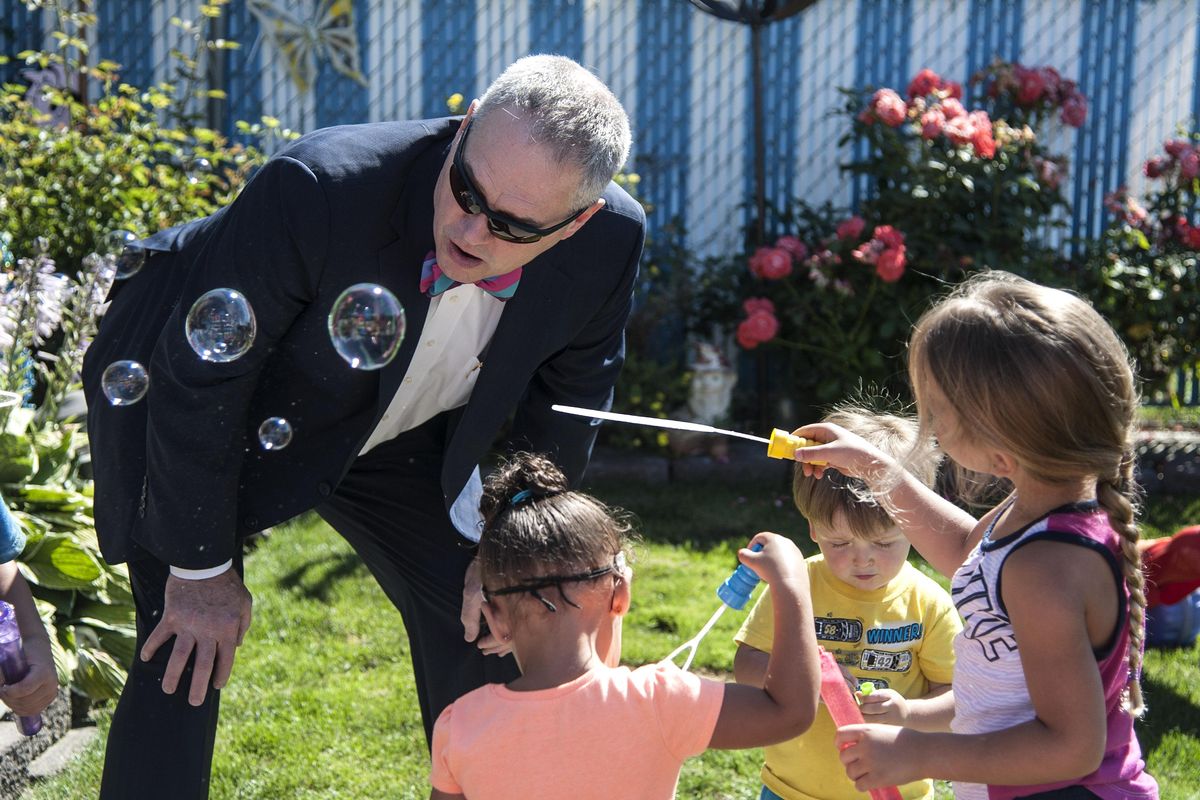Early Achievers sets mandatory quality standards for child care providers

Kinsley Stewart is loud and boisterous; one moment, she’s jumping from a plastic mat, the next, she’s blowing bubbles and trying to catch them on her pink, soapy wand.
When Ross Hunter, the director of Washington’s Department of Early Learning, walked through the front gate of Paula’s Playhouse Daycare in north Spokane, Kinsley turned to him and shouted, “Everyone hop like a bunny!”
Kinsley knelt on all fours. None of the 11 other children joined her, but Hunter played along.
“I spend all my time with adults,” he said as he joined the 4-year-old jumping in the air. “I should get some time to hop like a bunny.”
On Thursday, Hunter and others from the Department of Early Learning visited Paula’s Playhouse and its owner, Paula Rigsby, as part of a statewide tour. The officials met with child care professionals along the way to gauge their readiness for Early Achievers, a new state program that sets quality standards, tracks achievement and rates providers on a five-point scale.
Early Achievers eventually will allow the state to give child care providers feedback on how the kids in their care do when they get to school, Hunter said.
“When you look at the achievement gap (between low-income kids and their peers), it persists throughout K-12,” Hunter said. “And that’s a real problem.”
But for some providers, one of the biggest components of Early Achievers is the requirement to enroll by Monday.
Child care providers who serve children on state subsidies must enroll, or else they risk losing the reimbursements they receive from the state. For a licensed family home-care provider in Spokane who has 10 children on subsidies, that could mean losing upwards of $300 a day.
Furthermore, providers will have to be rated at level three by 2020. Ratings are determined by analyzing factors such as environment and how the provider interacts with children. Higher marks are given to those who engage in activities that teach children, rather than passively watching them, Hunter said.
As of Friday, about 95 percent of the roughly 380 providers in Spokane County had signed up.
“I buy three quarters of a billion dollars of child care every year,” Hunter said. “I’d kinda like to buy high-quality care.”
Vincent Alfonso is the dean of the School of Education at Gonzaga University and specializes in early childhood development. While he supports Early Achievers, he’s more cautious than some in going all in on standardizing development milestones, saying that most children learn and develop at different rates.
“Every kid has their own path that they’re on,” he said. “While I think it’s good to have standards and expectations, it’s also very necessary to have an understanding that children develop their own path.”
He did, however, acknowledge the benefit in identifying children’s needs, and said there’s nothing wrong with quality assurance, especially if the state is paying for the care for some children.
“But we need to be careful at the same time,” he added. “We need to avoid a situation like No Child Left Behind,” where schools couldn’t meet federal benchmarks, often because of factors outside the schools’ control, and were penalized. “We should look at the data, identify where we’re weak. Once we do that, the whole point is to improve education.”
The state Early Learning Department tracks development in six areas: math, language, cognitive development, literacy, social-emotional and physical. They’re looking to see if children can perform important tasks for their age such as recognizing rhyming patterns, or being able to count to 10 – indicators that they’ll succeed in kindergarten, experts say.
Kindergarten students who are on free or reduced-price lunch – which is available to families at or below 130 percent to 185 percent of the federal poverty level – often perform worse than affluent children in at least five categories. Math skills were lacking in all children surveyed, regardless of family income.
The state hopes to address gaps by providing help like coaches who can assist with teaching.
“Most of our goal here is, how do we actually fix the education system,” Hunter said. “Finding high-quality child care is very difficult. And we’re trying to alleviate that with state funding.”
Alfonso, at Gonzaga, isn’t as worried.
“It has to be recognized that not all children are going to learn at the same extent, and that does not mean there’s anything wrong with the child,” he said.
That’s the same philosophy Rigsby has had at Paula’s Playhouse for the last 30 years. The 12 children she currently looks after range in ages from toddlers to kids preparing to enter kindergarten. She’s one of about 60 providers rated at level four in Eastern Washington.
While she has two children of her own – ages 13 and 26 – she knew from a young age that she wanted more. And for the last 30 years, she’s helped hundreds of children take that first step toward public school.
“I told my mom I was gonna have 10 kids one day,” she said while helping Mikiyah Kilbourne, who was recovering from the embarrassment of falling into a toy chest. “My mom said, ‘Paula, you should go work for a day care for a day.’ So I did. And here I am.”